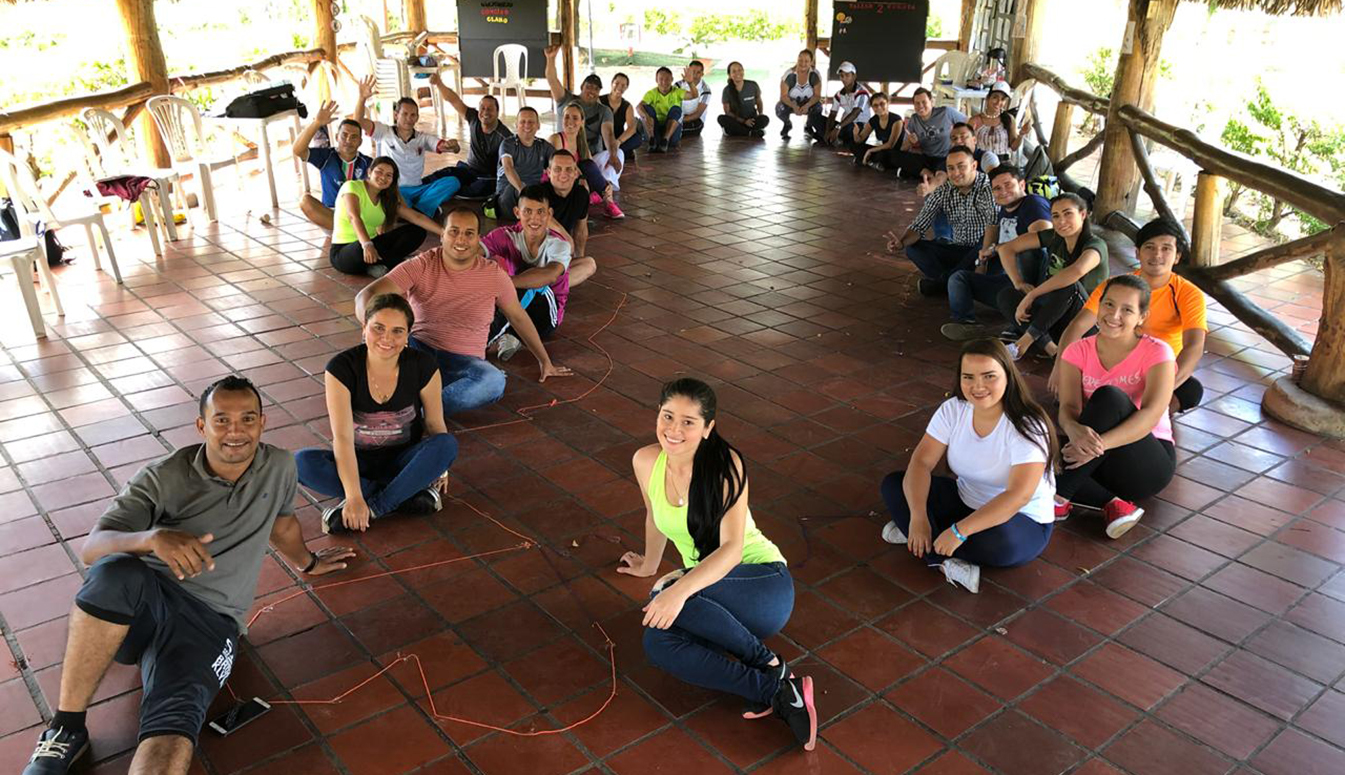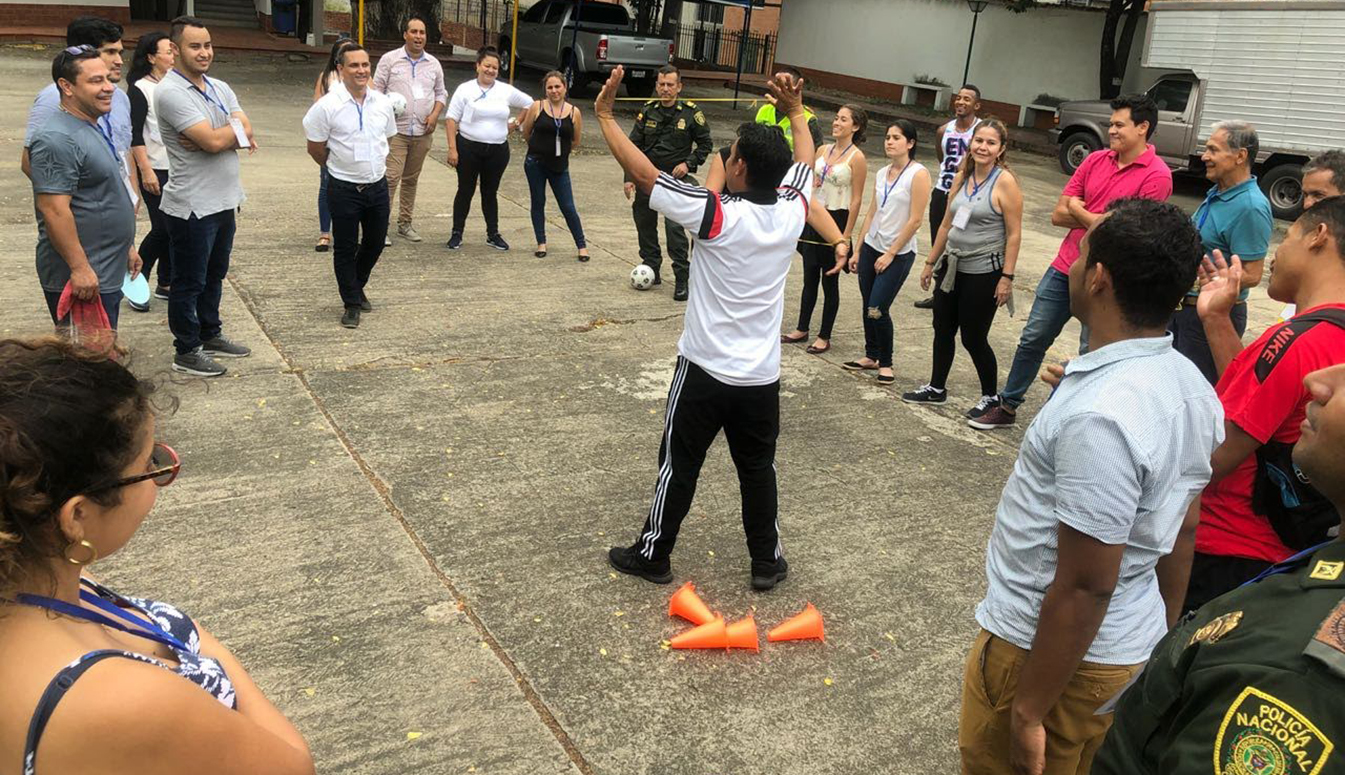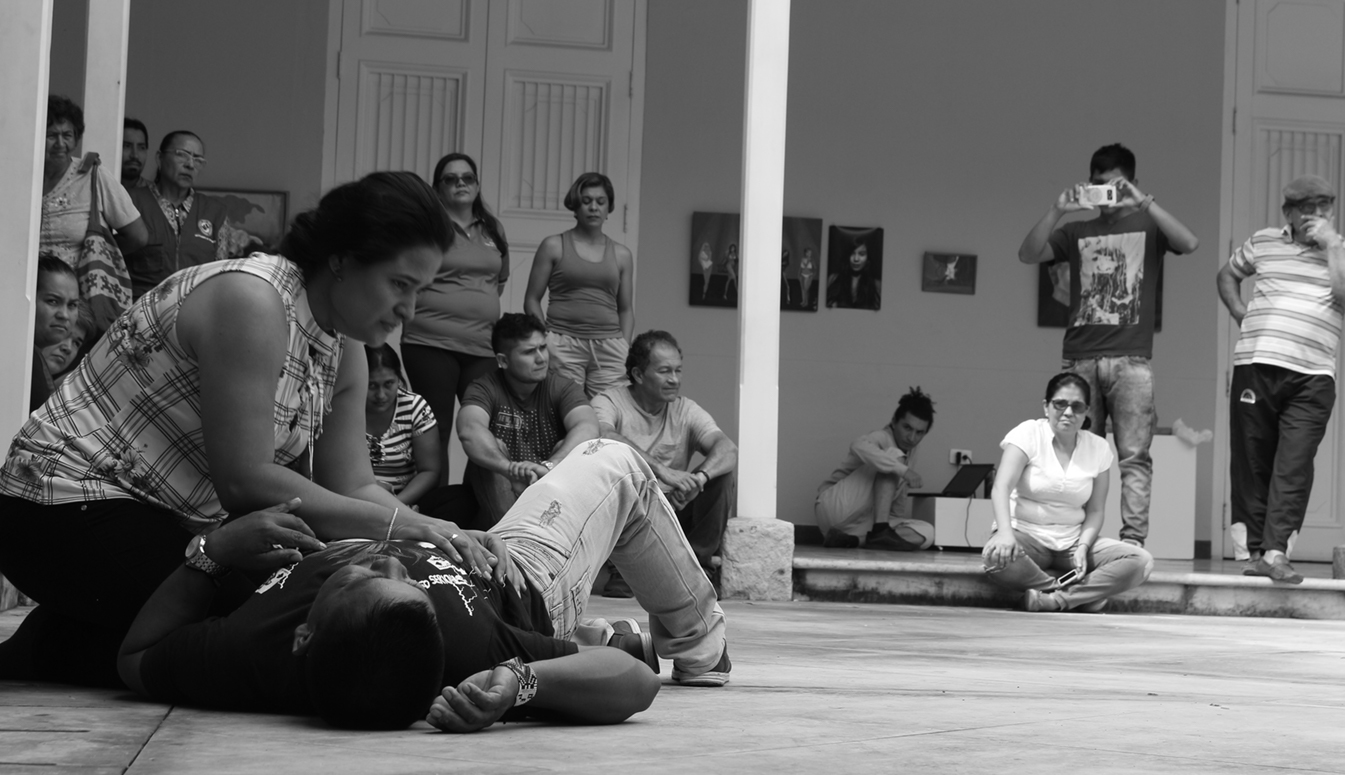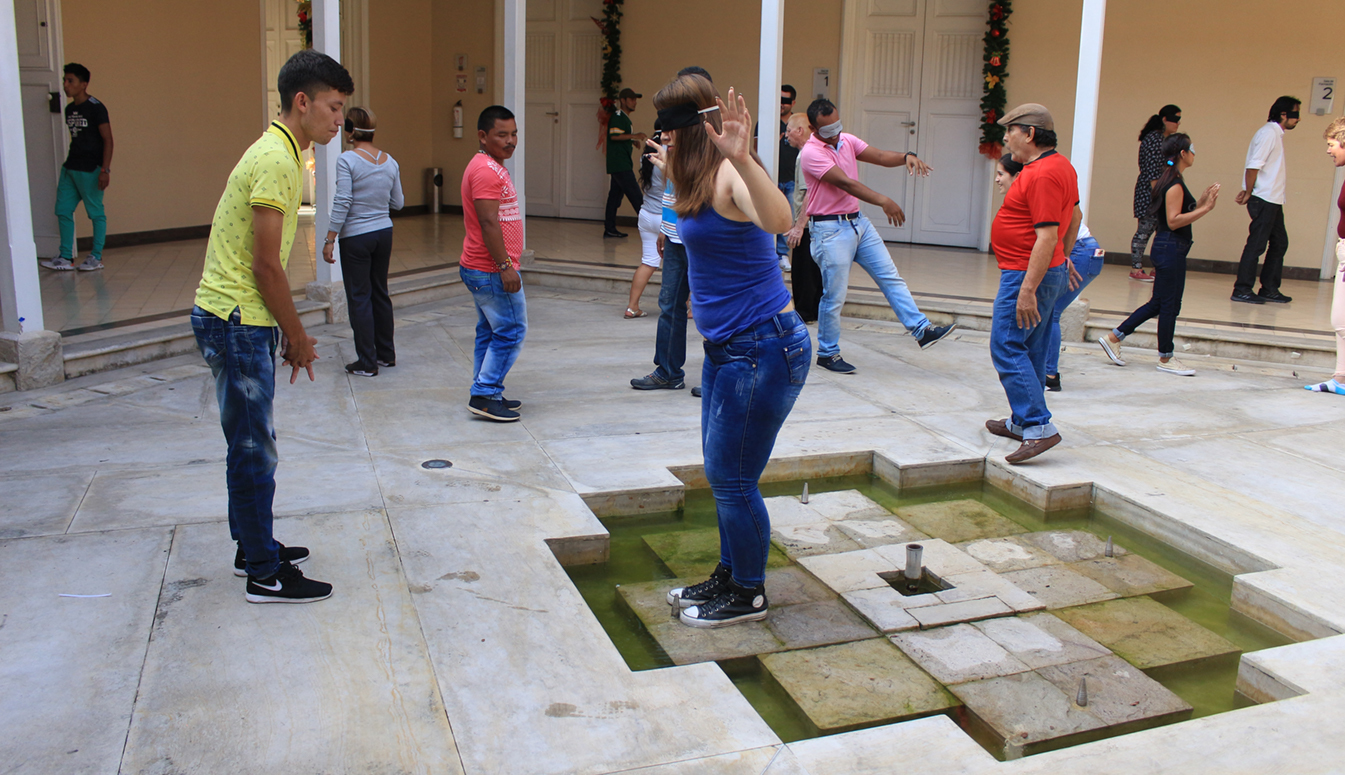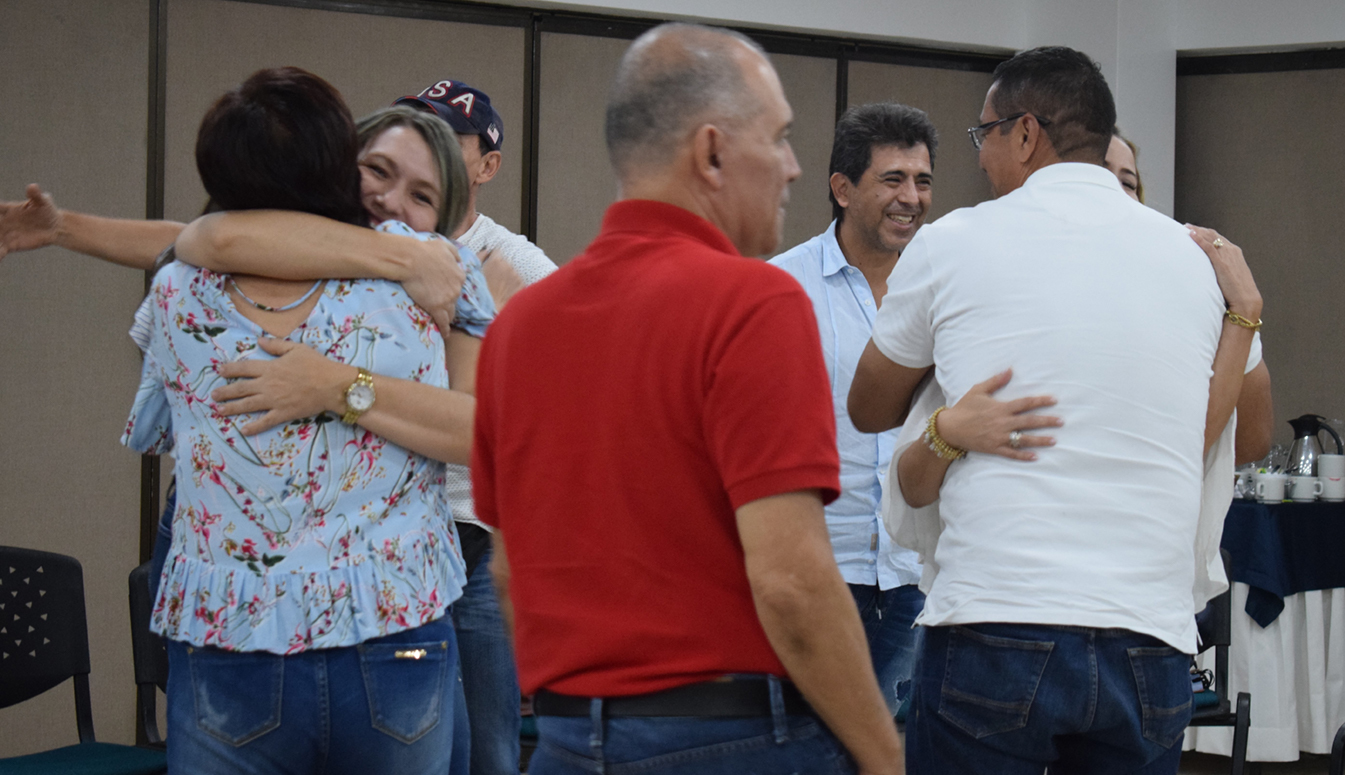PAST PROJECT
Regional peacebuilding in Colombia
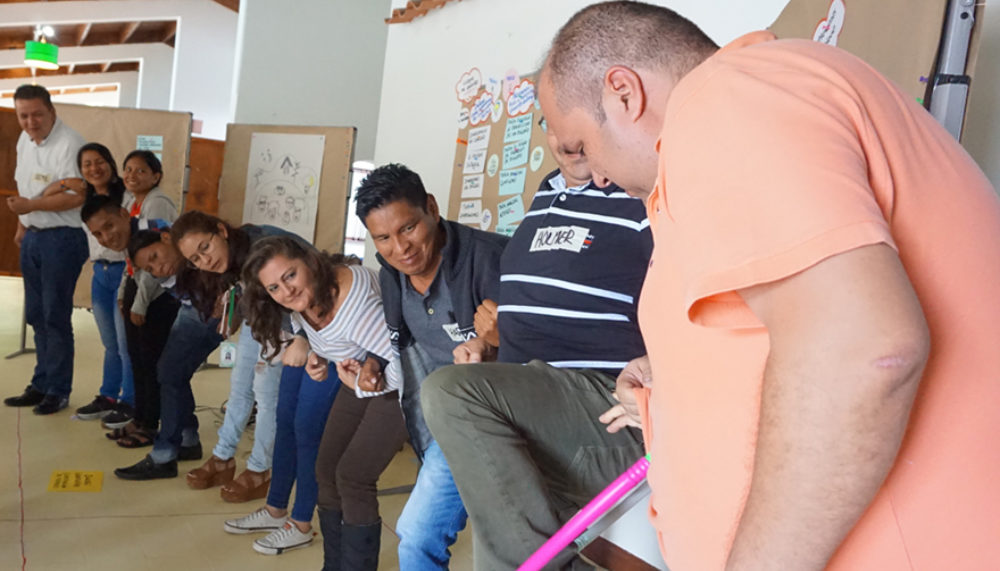
Our work accompanied Colombian actors in developing and implementing conflict transformation and peace efforts on different levels, and shares the lessons learnt in order to improve national policies.
Timeframe: 2015 - 2020
Focusing on regional peacebuilding in Colombia, our team and its network have been advising departments and municipalities on better transforming their violent conflict by using existing processes, such as for example, integrating peacebuilding in their regional and local development plans. Our work supports conflict transformation, violence prevention and the implementation of Colombia’s 2016 peace agreement at and from a subnational level. The consortium of Como-Berghof and its team in Colombia has been active in the framework of the German Development Cooperation's ProPaz programme, supporting actors from different sectors and national, regional and local level to better engage for peace.
Background
Conflict setting
Over five decades of armed conflict have left deep traces in Colombian society. The logic of violence has permeated public and private life. At the same time, there has been a multitude of peace initiatives within civil society that work to break with this logic and to achieve the transformations Colombia needs for peace.
Since end 2016, a peace agreement between Government and FARC ended a conflict of over half a century that had claimed over 220,000 victims and six million internally displaced persons. In October 2016, after four years of negotiations between the Colombian government and the FARC (formerly for Fuerzas Armadas Revolucionarias de Colombia – Revolutionary Armed Forces of Colombia, after 2017 stands for Political Party Fuerza Alternativa Revolucionaria del Común), a referendum on the peace agreement was held. However, the population rejected the peace agreement unexpectedly: numerous demands by various civil-society actors had not been taken into account. Moreover, the turnout in the referendum was very low, so that the peace treaty was rejected by a narrow majority. In the months that followed, various organisations and actors were able to put forward their demands. The peace agreement was revised and signed in a fast-track procedure, without a further referendum.
Since then, the country has been in the implementation phase of the peace agreement. Despite progress made, such as the disarmament of the FARC, the establishment of a truth commission and the amnesty law for former guerilleros and guerilleras, numerous difficulties can be observed, which lead some parts of the population to conclude that the agreement has failed. According to the fourth report on the state of implementation of the Peace Agreement, there have been advances in the active participation of victims, ex-combatants and civil society in the peace construction process. Moreover, the government adopted the PDETs (Programas de Desarrollo con Enfoque Territorial; Development Programmes with a Territorial Focus) for the rural areas in 2017. These development programmes are being implemented in the 170 municipalities most affected by the armed conflict, poverty, illicit economy and institutional weakness. Nevertheless, the implementation is still facing major challenges: In addition to slow progress in many areas of the agreement (e.g. access to important services in rural areas, democratic opening, solutions for the drug problems, food security), 2019 was the deadliest year for ex-combatants. The attacks on and killings of numerous civil society leaders, together with some controversial reforms, provoked a series of mass protests and posed great difficulties for the country.
Besides all these challenges and difficulties, President Duque suspended the peace talks between the government and the ELN (Ejército de Liberación Nacional – National Liberation Army) in January 2019 following an attack on a police school in Bogotá. Both parties accused each other of not keeping to the agreements.
Approach
Focusing on the concept of paz territorial ("peace from and for the territories"), the regional (i.e. subnational) peacebuilding component of ProPaz has supported actors in conflict transformation, violence prevention and, after the peace agreement, its implementation. One important work stream was to support departmental and municipal administrations in integrating peacebuilding measures into their respective development plans and other governance procedures.
Based on the idea that anchoring peace in all levels of society requires inclusive and participative processes, our team serves as adviser for the development of appropriate spaces and mechanisms of cooperation between different actors – public administration, civil society, the church and the private sector (multi-actor approach). Beyond this horizontal linkage, information exchange and consultation between the national and subnational level ensure that peace policies and processes take sufficient account of regional needs (multi-level approach).
By equipping key actors with a set of methodological tools on conflict-sensitive dialogue, facilitation and planning, we support the diverse actors in jointly planning and implementing peace-related measures in a peace-oriented way. This will play a particularly important role in the upcoming concertation process of the subnational development plans in early 2016, and their implementation in the years ahead.
We drew on our experience from accompanying a pilot project for regional peacebuilding, continuous consultation for GIZ-programme CERCAPAZ, the systematisation of the project SerMacarena, and from our long-term cooperation with Colombian organisations. Our process consulting includes analysis and exploration processes and sensitisation and capacity development interventions.
Aims and outcomes
Our work has clearly strengthened capacities for peacebuilding (relationships, attitudes, structures) on the national, regional and local level. That was, among others, reflected in the participatory development and implementation of subnational development plans and the implementation of their peace-related activities and guidelines peace policies. In this process, state and non-state actors make use of tried and tested methods of conflict-sensitive communication, constructive dialogue and cooperation. Subnational experiences with the implementation of peace policies were fed back to the national level and informednational guidelines and public policies.
Target groups
The team’s work addressed Colombian governments at all levels (national, departmental and local). The governments of Meta, Norte de Santander and Caquetá, and civil society organisations, the National Planning Department, the Office of the High Commissioner for Peace and the Ministry of Post-Conflict have been important partners in the implementation of this endeavour and will benefit from institutional strengthening and advice on policy implementation.
Regions
The initially two programme regions Meta and Norte de Santander, and as of 2019 Caquetá, are characterised by a combination of a strong presence of armed actors and a low presence of the state. They have been heavily impacted by the armed conflict and in Norte de Santander armed confrontations persist to this day. Given the precarious security situation, an abundance of natural resources and the regions' strategic location, they serve as exemplary regions for the preparation of the post-agreement phase. The activities there are complemented by accompanying the national institutions responsible for peacebuilding in their shaping and adapting of guidelines for regional implementation.
Partners and funding
The Berghof Foundation has been implementing the GIZ ProPaz component in partnership with Como Consult. The programme component cooperates with the Colombian National Planning Department, the Office of the High Commissioner for Peace, the Ministry of Post-Conflict, the departmental and municipal governments and civil society organisations.
The political partner of the German Development Cooperation is the Colombian Presidential Agency for International Cooperation (APC).
Activities
The activities of the team have been multifaceted: at national level, the team mainly provided advisory services. The strategy was to promote three aspects: conflict transformation, mainly through dialogue, violence prevention from a systemic approach, and support to the implementation of the peace agreement.
For example, it advised the Ministry of the Interior on the pedagogical dissemination of the plans for civil security and peaceful coexistence (PISCC), the National Planning Department (DNP), the Office of the High Commissioner for Peace (OACP) and the Ministry for Post-Conflict on strategy development and the development of guidelines for the integration of peace development issues and approaches into the development plans of the intervention regions.
At the regional level, the team provided support for the planning, preparation and implementation of the PDET measures, assisted in the preparation and implementation of local development plans by building dialogue platforms and capacities in the field of violence prevention and conflict transformation, and advised on the implementation of the peace agreement. By combining the systemic approach to violence prevention and remembrance work, sustainable capacities were built up through sport with principles and forum theatre, for example at the University of UFPSO, which has since been offering courses and online diplomas in the field of systemic approach to violence prevention and the design of multi-stakeholder dialogues. The team also helped to facilitate initial dialogues between the Barí indigenous people and the Catatumbo farmers' association.
Some examples of the team’s work:
September 2017 – Toolbox for local dialogue facilitation
The Peace Agreement between the Colombian government and the guerrilla movement FARC provides for the establishment of special development programs with a territorial approach (PDET) for regions most affected by the conflict. To ensure a wider participation in identifying visions and actions for these plans, the newly set up Territorial Renovation Agency (ART) assigned facilitation leaders to design and facilitate multi-actor and multi-level dialogues. To guide their work, a toolbox had been developed by ART with the advice of our team and the Office of the High Commissioner for Peace of the Colombian Government. The toolbox was first shared with all members of the newly created Facilitators’ Network at a reflection and training event on principles and tools of dialogue at the local level that took place in Bogotá on September 15-16.
May 2017 – Strategy workshop on regional development
Como-Berghof’s Andrés Home co-facilitated a strategy workshop with regional coordinators and the national office of Colombia’s Territorial Renovation Agency (ART). This agency is tasked with implementing rural development, a key element of the Peace Accord, through a process of participatory development of PDETs (Development plans with a territorial focus) in 16 subregions of Colombia.
November 2015 – Kick-off meeting for planning in Bogotá
In November 2015, the team and its partners held a kick-off meeting for planning in Bogotá, with regional governments and civil society actors from the programme regions and the Office of the High Commissioner for Peace, the Ministry of Post-Conflict and the National Planning Department.
September 2015 – Team “regional peacebuilding“ of Consortium Como-Berghof takes up work
On 23 September 2015, the component team, together with Uta Giebel from Como Consult and Barbara Unger from the Berghof Foundation, furthered the component's conceptualisation and operationalisation of regional peacebuilding. The advances of these working sessions were then shared with the whole programme team of ProPaz.
Updates from this work:
- Towards territorial peacebuilding in Colombia 29 May 2020
Publications 2020
- Agencia de Renovación del Territorio (ART) 2020. ¡Te propongo un plan! Guía para la articulación local entre el pilar PDET ‘Reconciliación, convivencia y construcción de paz’ con el PISCC, Colombia: Bogotá
- Alcaldía de Belén de los Andaquíes 2020. ¡Venga y le cuento cómo poner a andar la paz! Paso a paso del fortalecimiento al Consejo Territorial de Paz, Reconciliación y Convivencia (CTPRC) de Belén de los Andaquíes, Caquetá, Colombia: Secretaría de Posconflicto, Centro Administrativo Municipal. Available at: https://belendelosandaquiescaq...
- Departamento Nacional de Planeación 2020a. ¿Qué es la Guía metodológica para la formulación, implementación y seguimiento de los PISCC?, Colombia: 29/01/2020. Available on YouTube
- Departamento Nacional de Planeación 2020b. Diagnóstico para la elaboración de Planes integrales de Seguridad y Convivencia Ciudadana (PISCC), Colombia: 29/01/2020. Available on YouTube
- Departamento Nacional de Planeación 2020c. Formulación: Planes integrales de Seguridad y Convivencia Ciudadana (PISCC), Colombia: 30/01/2020. Available on YouTube
- Departamento Nacional de Planeación 2020d. Planeación financiera y operativa de Planes integrales de Seguridad y Convivencia Ciudadana (PISCC), Colombia: 30/01/2020. Available on YouTube
- Departamento Nacional de Planeación 2020e. Implementación en la ejecución de los programas y proyectos establecidos dentro del PISCC, Colombia: 30/01/2020. Available on YouTube
- Departamento Nacional de Planeación 2020f. Seguimiento y evaluación para el desarrollo de los PISCC, Colombia: 31/01/2020. Available on YouTube
- Diócesis de Granada en Colombia 2020. Lecciones y aprendizajes del proceso de prevención de violencias en el segundo año de implementación Mesetas – Meta, Granada, Meta
- EAI Belén 2020. Teatro Foro, Colombia: Escuela Audiovisual Infantil Belén, 07/04/2020. Available on YouTube
- Gobernación Norte de Santander 2020. En la casa del trueno. Encuentros para el diálogo intercultural entre el pueblo Barí y las comunidades de Ascamcat, Colombia
- Gobernación de Norte de Santander 2020. Estrategia y Ruta de diálogo para abordar conflictos interculturales en la Región del Catatumbo
- Gobierno de Colombia 2020. Guía metodológica para la formulación, implementación y seguimiento de los Planes Integrales de Seguridad y Convivencia Ciudadana (PISCC), Colombia: Bogotá. Available at: https://osc.dnp.gov.co/guia_to...
- Home, Andrés Felipe 2020. El lado ‘sexy’ del diálogo. Reflexiones para practicantes, Ocaña, Norte de Santander: Universidad Francisco de Paula Santander Ocaña (UFPSO)
- José Miguel Abad 2020. Infografía. ¿Cómo institucionalizar el diálogo? Oficina del Alto Comisionado para la Paz 2020. Guía de diálogo para alcaldes y alcaldesas. El camino más largo es a veces el más seguro, Colombia
- Rodríguez, Jorge 2020. Aprender del pasado para cambiar el presente. Propuesta para incorporar procesos de memoria histórica vinculados con iniciativas del Pilar 8 de los PATR en las estrategias territoriales de prevención de la violencia, Bogotá: Agencia de Renovación del Territorio (ART)
- UNIMINUTO 2020. Consolidación de las capacidades de UNIMINUTO para la inclusión de medidas del Programa de Desarrollo con Enfoque Territorial –PDET- en los Planes de Desarrollo territorial 2020-2023. Lecciones aprendidas y recomendaciones del proceso 2019-2020
- Universidad Francisco de Paula Santander Ocaña 2020. El Diálogo Transformador. 01/09/2020. Available on YouTube
Publications 2019
- Abad, José Miguel & Andrés Home & Barbara Unger & Dirk Splinter & Ljubjana Wüstehube 2020. Ein Friedensabkommen allein macht noch keinen Frieden. Wolfgang Metzner Verlag.
- Asociación de Autoridades Tradicionales del Pueblo Barí 2019. La fuerza de la palabra. Reflexiones y aprendizajes del pueblo Barí sobre diálogo y construcción de paz, Colombia: Tibú
- ASOMUNICIPIOS 2019. ¡El palo si está para cucharas! Aportes y desafíos de ASOMUNICIPIOS en la construcción de paz territorial, Asociación de Municipios del Catatumbo, Provincia de Ocaña y del Sur del Cesar, 26/02/2019. Available on YouTube
- Corporación Desarrollo para la Paz del Piedemonte Oriental 2019. ¡Insistir, persistir y no desistir! Lecciones y aprendizajes para implementar rutas de trabajo y fortalecimiento con la Acción Comunal en escenarios de posacuerdo y construcción de paz (2017-2018), Colombia: Corporación Desarrollo para la Paz del Piedemonte Oriental. Available at: https://redprodepaz.org.co/exp...
- Fernández Niño, Carlos Hernán & Gustavo Osorio Carrascal & Wilson Angarita Castilla & Maritza Caicedo Mantilla & Marlon Álvarez Blanco & Rocío Andrea Miranda Sanguino & Juan Manuel Paredes Llain 2019. ¡Diálogo improbable! Un camino hacia la paz, Colombia: Universidad Francisco de Paula Santander Ocaña. Available at: https://ufpso.edu.co/ftp/pdf/d...
- GIZ 2019. ¿Cuál es la participación real del ciudadano colombiano en los procesos democráticos? Available at: https://www.giz.de/en/worldwid...
- Gomez, Jose 2019. Joven Prevenido(a) vale por dos, Colombia: Diócesis de Granada en Colombia, 28/03/2019. Available at: https://www.dgc.org.co/joven-p...
- Organización Ñatubaiyibarí 2019. KRA ABRI La Fuerza de la palabra, 15/03/2019. Available on YouTube
- Osorio Carrascal, Gustavo & Wilson Angarita Castilla & Maritza Caicedo Mantilla & Marlon Álvarez Blanco & Rocío Andrea Miranda Sanguino & Juan Manuel Paredes Llain 2019a. El territorio se ordena alrededor de la paz. Sistematización de la experiencia “Fortalecimiento de capacidades de actores territoriales para la participación y el diálogo en torno a los procesos de Ordenamiento Territorial con un enfoque de Acción sin Daño y Construcción de Paz”, Colombia: Universidad Francisco de Paula Santander Ocaña. Available at: https://ufpso.edu.co/ftp/pdf/d...
- Osorio Carrascal, Gustavo & Wilson Angarita Castilla & Maritza Caicedo Mantilla & Marlon Álvarez Blanco & Rocío Andrea Miranda Sanguino & Juan Manuel Paredes Llain 2019b. Ordenando la casa para vivir en paz. Guía para participar en la construcción de los planes de ordenamiento territorial con enfoque de construcción de paz, Colombia: Universidad Francisco de Paula Santander Ocaña. Available at: https://ufpso.edu.co/ftp/pdf/d...
- Osorio Carrascal, Gustavo & Wilson Angarita Castilla & Maritza Caicedo Mantilla & Marlon Álvarez Blanco & Rocío Andrea Miranda Sanguino & Juan Manuel Paredes Llain 2019c. “¿Qué gallo ordenar la tierrita!”. Territorio, participación y paz, Colombia: Universidad Francisco de Paula Santander Ocaña. Available at: https://ufpso.edu.co/ftp/pdf/d...
- Pastoral de Medios 2019. Video de Sistematización. Fortalecimiento de Capacidades para la Prevención Sistémica de Violencias Juveniles, Colombia: Diócesis de Granada en Colombia, 31.01.2019. Available on YouTube
- Secretaría Departamental de Derechos Humanos y Paz 2019. “Mejor compartir que guardar”. Aprendizajes del acompañamiento a instancias de Derechos Humanos y paz del Meta, 2017-2018, Colombia: Gobernación del Meta
- Unger, Barbara 2019. "Insistimos en la paz": roles, retos y oportunidades de la sociedad civil colombiana e internacional en el proceso de paz en Colombia. En: Hispano-Americana, 64, edited by Roland Spiller / Thomas Schreijäck 2019. Colombia: memoria histórica, posconflicto y transmigración, 155-182.
- UNIMINUTO 2019. Estrategia de fortalecimiento de capacidades institucionales para la construcción de paz y la convivencia con Enfoque Territorial, Colombia: Corporación Universitaria Minuto de Dios
- Universidad Francisco de Paula Santander Ocaña 2019. “¿Qué gallo ordenar la tierrita!”. Territorio, participación y paz, Colombia: Universidad Francisco de Paula Santander Ocaña, 28/03/2019. Available on YouTube
Publications 2018
- Benítez Páez, Luis M. & José Miguel Abad 2018. ¡Mucha mierda! Manual de Teatro Foro como herramienta para la prevención de la violencia con enfoque sistémico, Colombia: Secretaría de Gobierno Departamental, Gobernación Norte de Santander, Cúcuta. Available at: http://www.nortedesantander.go...
- Comunicaciones Consornoc 2018a. Proyecto Piloto Prevenir Primero, Colombia: Corporación Nueva Sociedad de la Región Nororiental de Colombia, 01/08/2018. Available on YouTube
- Comunicaciones Consornoc 2018b. Proyecto Piloto Prevenir Primero, Colombia: Corporación Nueva Sociedad de la Región Nororiental de Colombia, 04/08/2018. Available on YouTube
- Contreras Mendoza, Jesús Alfredo 2018. La Santa Cruz, el momento en que todo cambió. Sistematización experiencia proyecto piloto Prevenir Primero Ocaña, Norte de Santander. Available at: http://www.consornoc.org.co/wp...
- Corporación Desarrollo para la Paz del Piedemonte Oriental (CORDEPAZ) 2018a. Asesoría a Juntas de Acción COMUNAL en contextos de Construcción de Paz. Available at: http://cordepaz.org/publicacio...
- Corporación Desarrollo para la Paz del Piedemonte Oriental (CORDEPAZ) 2018b. Fortalecimiento de las capacidades organizacionales para las JAC de Uribe y Mesetas – Meta, 28/02/2018. Available on
YouTube - El Cuarto Mosquetero 2018. JÓVENES DE LA SUBREGIÓN DE LA MACARENA SE REÚNEN PARA HABLAR DE PAZ, 27/07/2018. Available on YouTube
- El Sirirí 2018. Plataforma Sirirí. Medición en red de la participación ciudadana formal en Colombia. Available at: http://elsiriri.ideaspaz.org/
- Fundación Ideas para la Paz 2018a. Programas de Desarrollo con Enfoque Territorial: cambiar el rumbo para evitar el naufragio. Balance bajo la metodología de observación y medición “El Sirirí”, Colombia: Bogotá, Octubre 2018. Available at: http://ideaspaz.org/media/webs...
- Fundación Ideas para la Paz 2018b. Una mirada a la participación ciudadana y la construcción de paz en el Catatumbo. Medición de calidad y eficacia de instancias de participación con la metodología el Sirirí, Colombia: Bogotá, Octubre 2018. Available at: https://drive.google.com/file/...
- Fundación Ideas para la Paz 2018c. Una mirada a la participación ciudadana y la construcción de paz en el Meta. Medición de calidad y eficacia de instancias de participación con la metodología el Sirirí, Colombia: Bogotá, Octubre 2018. Available at: https://drive.google.com/file/...
- Gobernación Norte de Santander 2018. ¿Qué es Teatro Foro? Intro/Capítulo 1, Colombia: Secretaría de Gobierno Departamental, Cúcuta. Available on YouTube
- Plataforma Diálogos Improbables 2018a. Encuentro de expertos. Encuentro Internacional de Diálogo entre Opuestos, 17/07/2018. Available on YouTube
- Plataforma Diálogos Improbables 2018b. Encuentro Internacional de Diálogo entre Opuestos en Procesos de Transición, 17/07/2018. Available on YouTube
- Rodríguez Villasuso, Jorge 2018. El que previene primero, previene dos veces: Cómo replicar el programa ‘Prevenir Primero’, con enfoque sistémico para la prevención de la violencia, en otros municipios, Colombia: Secretaría de Gobierno Departamental, Gobernación Norte de Santander, Cúcuta. Available at: http://www.nortedesantander.go...
- Transformemos Paz 2018. Foro Recomendaciones a la RAE del PDET Macarena-Guaviare, julio 2018, 26/07/2018. Available on YouTube
- Vela Mantilla, Gloria Esperanza 2018. Aprendizajes y Lecciones del Proceso El Sirirí 2015-2017. Asesoría a la FIP en la Estrategia de Gestión del Conocimiento de la metodología Sirirí, Colombia: Bogotá, Fundación Ideas para la Paz, Septiembre 2018. Available at: https://drive.google.com/file/...
Publications 2017
- Agencia de Renovación del Territorio 2017. El diálogo en los núcleos veredales. Caja de herramientas metodológicas para facilitadores(as) de diálogo en el marco de los Programas de Desarrollo con Enfoque Territorial (pdet), Colombia: Bogotá.
- Dudouet, Véronique & Stina Lundström 2017. Transiciones políticas para el posconflicto: ¿De procesos participativos a resultados incluyentes en materia de construcción de Estado y gobernanza? Informe de investigación.
- Gobierno de Colombia & Oficina del Alto Comisionado para la Paz. 2017. ¿Qué es educar y formar para la paz y cómo hacerlo? Educación y Pedagogía para la Paz – Material para la práctica, Colombia: Acción CaPaz: Estrategia de capacidades para la paz y la convivencia, Septiembre de 2017. Available at: https://educrea.cl/wp-content/uploads/2019/10/DOC2-educar.pdf
- Oficina del Alto Comisionado para la Paz OAC 2017. Acción CaPaz: Estrategia de capacidades para la paz y la convivencia, Colombia: Bogotá, Versión 2, Junio de 2017. Available at: https://de.scribd.com/document...
- Prada, María Paula & Myriam Sánchez, & Isabel Restrepo 2017. Acción CaPaz: Estrategia de capacidades para la paz y la convivencia. Documento de profundización, Colombia: Bogotá.
- Prada, María Paula & Myriam Sánchez, & Isabel Restrepo, Zohanny Arboleda 2017. Acción CaPaz: Estrategia de capacidades para la paz y la convivencia, Colombia: Bogotá, Versión 2, Junio de 2017.
Publications 2016
- Avila, Andres 2016. Sistemas Locales de Justicia, 22/09/2016. Available on YouTube
- Cantillo, Lorena 2016. Asomunicipios. Gestión y articulación para el desarrollo regional en contextos de conflicto y de construcción de paz, Deutsche Gesellschaft für Internationale Zusammenarbeit (GIZ) GmbH, Colombia: Bogotá.
- Departamento Nacional de Planeación & Oficina del Alto Comisionado para la Paz & Despacho del Ministro Consejero para el Post-Conflicto, Derechos Humanos y Seguridad 2016. Los Planes de Desarrollo Territoriales como un instrumento de construcción de paz, Febrero de 2016. Available at: http://viva.org.co/PDT_para_la...
- Montanus, Antonia & Nele Rathke & Barbara Unger 2016. Organizaciones amenazadas, pero fuertes - Un enfoque psicosocial en el manejo integral de amenazas. Un modelo para organizaciones de DDHH y organizaciones donantes.
- Planta, Katrin 2016. Interdependencia e interferencia. El sistema normativo de los wayuu y los mecanismos estatales de resolución de conflictos en Colombia.
- Prada, María Paula & Myriam Sánchez & Isabel Restrepo, Zohanny Arboleda 2016. Acción para la Paz, Estrategia de capacidades para la paz y la convivencia, Octubre de 2016, Colombia: Bogotá.
- Unger, Barbara 2016. Der Friedensprozess in Kolumbien: Friedensabkommen, Friedensnobelpreis und noch kein Frieden. FriEnt Impuls Article. 2016. Bonn: FriEnt. [in German]
Project lead
Barbara Unger
Senior Advisor
email hidden; JavaScript is required
Team members
Fabian González Neumann
Media contact
You can reach the press team at:
+49 (0) 177 7052758
email hidden; JavaScript is required
